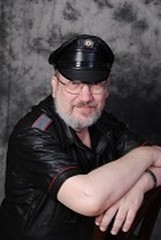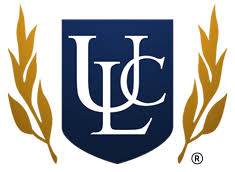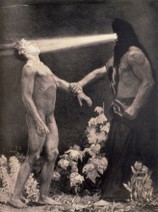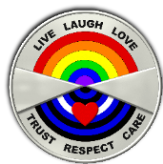Who I Am

My name is Dan Shackelford. I have been called "Shack" or "Master Shack" throughout most of my adult life. (Coincidentally my father's nickname in the Army was also "Shack.") I am an avid science fiction fan — some might say fanatic — and an equally avid collector and computer artist. I am a service-disabled (10% disability rating) Vietnam veteran ('70-'71 67th Med Bn) and am proud also to have served my Country as a mid-level career Civil Servant; if you have a problem with that this may be a good time to leave. I am now retired although lately I seem busier than ever.
 I am a gay man. It is not a phase that I am going through. I did not chose to be gay, it is just what I am. I knew I was "different" at least from about age 5 but I didn't know what that difference was; I also knew that this difference was something I had to keep quiet about.
I am a gay man. It is not a phase that I am going through. I did not chose to be gay, it is just what I am. I knew I was "different" at least from about age 5 but I didn't know what that difference was; I also knew that this difference was something I had to keep quiet about.In simple terms, being gay means that you are sexually attracted to members of your own sex and that you identify with other gay people or the larger gay community. Sexuality is a term used to describe a whole range of feelings, desires and actions relating to sex. Being gay does not mean that I dislike women or don't find them attractive. I can and do appreciate a beautiful woman. I just am not sexually attracted to them.
By and large, society tends to assume that everyone is, or wants to be, heterosexual. This is known as heterosexism. Some people continue to believe that it is a choice and that we can be persuaded into heterosexuality. By assuming heterosexuality, society gives rise to the dilemma, for those of us who know we are gay, of whether to hide our sexuality or to come out - with all that this entails. I was lucky, my parents did not throw me out or disown me when I eventually came out to them.
When I first realized that my "difference" was primarily* in my sexuality I worked hard at concealing it. I wasn't paqrticularly afraid of being ostracised because I did not have a lot of friends to start with. I was afraid of physical violence. There were no positive gay role models and a lot of hostility towards openly gay people. If homosexuality was mentioned in school (Catholic grammar school in the 50's) it was only to suggest that we pray for "them" because "they" were condemned to hell for being homosexual. (Of course "we" were all normal heterosexual children because we were good Catholics.) I knew they were referring to me but somehow I also knew that they had it wrong. A loving God would not condemn a soul because of a "mistake" He made when creating that gay soul. However, refraining from acting on my feelings might be a special "test" God had given me or maybe it was His way of telling me I was destined for something other than marriage. And so, by the 7th grade, I had decided to go either into the healing arts or the priesthood. (The good Sisters of Mercy strongly encouraged the priesthood of course.) Either way I could immerse myself in my calling and forget about sexuality. Fortunately it didn't work out that way.
* Sexuality was not my only "difference." While most of my friends preferred physical activities such as sports, role-playing games, and just running around like nervous cats; I preferred intellectual pursuits such as reading almost anything I could get my hands on. I loved period fiction, science articles, even philosophy and mathematics. By the time I was about 7 I found I also had a sado-masochistic streak (although I didn't know what it was called). I realized then that I really liked movies where men got tied up and bondage became a theme of my dreams and fantasies. I also liked interrogation and torture scenes - particularly if the male victim's shirt was torn off or removed.
 June 26, 2015 marks a major milestone for civil rights in the United States, as the Supreme Court announced its decision in Obergefell v. Hodges. By one vote, the court ruled that same-sex marriage cannot be banned in the United States and that all same-sex marriages must be recognized nationwide, finally granting same-sex couples equal rights to heterosexual couples under the law.
June 26, 2015 marks a major milestone for civil rights in the United States, as the Supreme Court announced its decision in Obergefell v. Hodges. By one vote, the court ruled that same-sex marriage cannot be banned in the United States and that all same-sex marriages must be recognized nationwide, finally granting same-sex couples equal rights to heterosexual couples under the law.Obergefell originated with a gay couple, Jim Obergefell and John Arthur, who were married in Maryland, where same-sex marriage was legal, but whose marriage was not recognized by Ohio authorities. As often happens with Supreme Court cases, a number of similar cases in Ohio and elsewhere were consolidated into what became Obergefell v. Hodges. The Supreme Court heard arguments on April 28, 2015. On June 26, the court ruled 5-4 in favor of the plaintiffs, stating that both bans on same-sex marriages and bans on recognizing same-sex marriages were unconstitutional. Writing for the majority, Justice Anthony Kennedy said, "“The right to marry is a fundamental right inherent in the liberty of the person, and under the Due Process and Equal Protection Clauses of the Fourteenth Amendment couples of the same sex may not be deprived of that right and that liberty.” Chief Justice John Roberts and three Associate Justices—Antonin Scalia, Clarence Thomas and Samuel Alito—each wrote dissenting opinions. The ruling overturned the 13 statewide bans still in effect and effectively settled the issue at the federal level, although a few rogue counties ignored the ruling.
One year after this ruling we went to the Bexar County Courthouse to get a marriage license. Frankly, I expected problems, Texas is not a very liberal State and the Texas ban on same-sex marriage was one of those overturned by the Supreme Court. But everything went very smoothly.
One month later, on July 16, 2016, Darrel Riley and I were legally married.
I may be multi-talented but being a leatherman does not mean I am a multitool made by Leatherman Tool Group of Portland, Oregon, US.I am a member of the homosexual male subculture that grew out of male-only motorcycle clubs formed by homosexual veterans returning from World War II, stressing masculinity in contradiction of androgynous and effeminate gay stereotypes. Leathermen are usually characterized by a fetish for leather gear, a sense of hierarchy, a fraternal code of protocol and behavior, and are often sexually involved in BDSM (bondage/discipline, dominance/submission, sadism/masochism). It is my belief that the subculture developed because returning WWII gay veterans missed the feelings of close comeraderie with other men that they could not get from typical civilian life in the 1940's and 1950's.My interest in leather gear does not quite have the status of a fetish but I do have a strong sense of hierarchy and believe in the fraternity of leathermen. My household is built on protocol and a very strong set of values. And I am very definitely involved in BDSM. If you are curious about any of this and have questions, you are welcome to contact me. I will do my best to answer your questions quickly and honestly.
 I enjoy teaching.
I enjoy teaching.When I was young I hated having to speak, or do anything, in front of an audience. Then, when I was doing my undergraduate work, my faculty advisor asked me to substitute for her for one of the biology labs. Seeing "the light come on" when the people in the class "got it" was amazing and I was hooked. I applied for a teaching assistantship almost immediately (in addition to my research assistant position).* When I went on active duty with the Army I was successful in almost every mission because I took the time to teach my soldiers how to accomplish the tasks to my standards. When I left active duty and eventually joined the federal civil service I sought out opportunities to teach even if only on a small scale. Eventually I developed courses on Contracting with the Department of Defense and business ethics in Government contracts. My primary audience was small businesses just getting started with Government business. My audiences for these classes ranged from about ten people to over 500. About twenty years ago a friend convinced me that I had the skill and knowledge to teach about BDSM and I have been doing that ever since.
Once I settled into retirement the teaching bug bit much deeper. I now own and run the Alamo City Training Academy. The Academy is devoted to providing formal education opportunities concerning alternative lifestyles. We are currently offering classes relevant to the BDSM lifestyle. I am also working on curricula for the GLBT and Transgender communities.
* Frankly, the research and teaching opportunities were the only things thing I consider worthwhile from the year I wasted in graduate school. Faculty rivalries and academic politics taught me a lot about human nature but interfered with any real learning about science. It was nearly 30 years later that I had decent experiences in "functional" graduate learning environments (at the University of Virginia and the University of Pennsylvania).
 I am an ordained minister of the Universal Life Church.
I am an ordained minister of the Universal Life Church.The only doctrine of Universal Life Church is: “Do that which is right.” We believe in the absolute freedom of religion as it pertains to peaceful, non-fraudulent activity that does not infringe on the rights of others.
Under the First Amendment of the United States Constitution, Universal Life Church ordination is recorded at Modesto Headquarters, is recognized as legal in all 50 States and does not expire.
The Universal Life Church is a universal church. (No specific denomination.) It offers legal ordinations to become a minister, free of charge. As an ordained minister of the Universal Life Church, you can officiate weddings, funerals, baptisms and perform other functions of the clergy. It also offers courses of study on religious topics that can lead to earned degrees recognized by California. (You do not have to be a ULC member or minister to take the courses.)
ULC Ministers are from many walks of life and come from every spiritual tradition you can imagine. Likewise, there are also many ordained ministers with no religious affiliation. Our ministers’ philosophies may fall into many schools of thought including Atheist, Abrahamic, Secular, Esoteric, New Age and even Cosmic. Many are not affiliated with any established religious group at all, because their belief systems lie outside the bounds of any church other than the ULC. [Personally, I consider myself a rational deist. I believe in God as a rational/logical necessity. I understand Christianity, perhaps too well after 17 years of Catholic education/indoctrination. I also have studied the Bible, comparative theology, Eastern religions, shamanism and Wicca.]
So why did I decide to become a minister of the ULC? Actually that could be a long story but I will try to keep it brief.
I was raised as Roman Catholic and attended Catholic schools from kindergarden to the first year of graduate school. From a very early age I was told that I was destined to be a Catholic priest, and I belived it until I was a Junior in High Schhol. One of the teachers who I greatly admired, a Vincentian priest, told me that the priesthood might not be what I expected it to be. That many priests at all level in the church wore the religion around their neck (referring to the roman collar) rather than in their heart. I might become disillusioned by the fact that many just considered the priesthood as a job with good job security. That shook me and I took his advice to delay attending the seminary until I had learned more about life and myself. In college I saw some of what he meant. Many of my professors were priests who didn't behave in what I would have considered a priestly manner. In the years that followed I came to know many priests who gave excellent sermons but didn't seem to believe what they were saying. some of them were also great showmen when it came to conducting services/ceremonies; one even told me that "the better the show, the better you got paid".
Fast forward to 1982, I met a man who I immedistely liked and trusted. As a "side job" he happened to be a christian minister who was planning a non-denominational christian religious community for gay men who had become disillusioned with their denominations but had a desire to serve God in some way. I joined the community. It felt like home because the community welcomed everyone. Within a couple of years I had risen to be a regional superior and was ordained as a deacon following Old Catholic rites. Unfortunately, the organization took in many new men who seemed more interested in wearing the collar than in performing the service and our Abbot disolved the community when he retired. (Personally, I found the collar useful for getting things done that would otherwise have been very difficult. Example, a family that could not afford a gravesite for their recently deceased father appealed to me. I was wearing my monk's habit when I visited the cemetary. The cemetary manager apologized for the "confusion" and quickly donated a gravesite. A headstone was more difficult but wearing the habit earned a substantial discount for the family. To me, the religious habit or collar was a useful tool to facilitate accomplishing a service.)
Fast forward again. Over the years I have been asked to officiate at many ceremonies and have done blessings, funerals, unions, collarings, and have even delivered a few sermons. This ordination allows me to be recognized legally by the County and State as a minister who can perform legal marriages. And it doesn't require me to adopt a particular denomination or set of beliefs that might be contrary to my rather unorthodox personal beliefs.
 I first became interested in hypnosis reading Mandrake the Magician comics when I was in grammar school. Mandrake was an itinerant hypnotist/crime fighter who always dressed in tails, top hat and opera cape and who foiled criminals using instant hypnosis and illusion. Even then I knew that I wanted the ability to "bend peoples' minds" to do my bidding, for good purposes only of course. When I learned that there were books on hypnosis at the public library I sarted reading feverishly. Fortunately for my schoolmates' sake, by the time I entered high school my focus had shifted to the sciences and languages.
I first became interested in hypnosis reading Mandrake the Magician comics when I was in grammar school. Mandrake was an itinerant hypnotist/crime fighter who always dressed in tails, top hat and opera cape and who foiled criminals using instant hypnosis and illusion. Even then I knew that I wanted the ability to "bend peoples' minds" to do my bidding, for good purposes only of course. When I learned that there were books on hypnosis at the public library I sarted reading feverishly. Fortunately for my schoolmates' sake, by the time I entered high school my focus had shifted to the sciences and languages.Back before the turn of the century I renewed my interest in hypnosis and decided to go back to school and learn what it was all about. I am now a professionally certified Master Hypnotist. (I also have the supervised client hours to be certified as a Hypnotherapist, I just have not applied for that title.) I did have a part-time hypnotherapy practice for a while but have retired from that. I still work with occasional clients when they are requesting something unusual or interesting, otherwise I refer them to local hypnotists in whom I have confidence.
I also enjoy using erotic hypnosis and even teach it.

Statistics (if anyone is interested)
Born: July 14, 1945 in Chicago, IL
Died: NOT YET
Ethnicity: Caucasion (White)
Heritage: English/German with a touch of Irish
Height: 5'11"
Weight: about 200± lbs
Hair: Light Brown with a lot of Gray
Beard: Mostly Gray
Moustache: Mostly Gray
Eyes: Both Blue
Religion: Spiritual (Raised Catholic but I am more of a Rational Deist today)
Military Service: Army Medical Service Corps Officer
Work: Retired from Federal Civil Service (GS-15 Procurement Analyst)
Preferences: Yes, I got 'em
Politics: Not Republican
Education: Master's Degree (no pun) [Executive MSE from University of Pennsylvania]
Personality Type: INTJ *
Residence: San Antonio, TX
* You can take a free and easy to complete analysis of your personality type at http://www.humanmetrics.com/cgi-win/jtypes2.asp. I did and my results are below:
Introvert(50%)
iNtuitive(25%)
Thinking(28%)
Judging(28%)
To outsiders, INTJs may appear to project an aura of "definiteness", of self-confidence. This self-confidence, sometimes mistaken for simple arrogance by the less decisive, is actually of a very specific rather than a general nature; its source lies in the specialized knowledge systems that most people of this type start building at an early age. When it comes to their own areas of expertise -- and INTJs can have several -- they will be able to tell you almost immediately whether or not they can help you, and if so, how. INTJs know what they know, and perhaps still more importantly, they know what they don't know.People of this type are perfectionists, with a seemingly endless capacity for improving upon anything that takes their interest. What prevents them from becoming chronically bogged down in this pursuit of perfection is the pragmatism so characteristic of the type: INTJs apply (often ruthlessly) the criterion "Does it work?" to everything from their own research efforts to the prevailing social norms. This in turn produces an unusual independence of mind, freeing them from the constraints of authority, convention, or sentiment for its own sake. INTJs are known as the "Systems Builders" of the types, perhaps in part because they possess the unusual trait combination of imagination and reliability. Whatever system this type happens to be working on is for them the equivalent of a moral cause to an INFJ (Introverted, Intuitive, Feeling, Judging); both perfectionism and disregard for authority may come into play, as INTJs can be unsparing of both themselves and the others on the project. Anyone considered to be "slacking," including superiors, will lose their respect -- and will generally be made aware of this; INTJs have also been known to take it upon themselves to implement critical decisions without consulting their supervisors or co-workers. On the other hand, they do tend to be scrupulous and even-handed about recognizing the individual contributions that have gone into a project, and have a gift for seizing opportunities which others might not even notice.In the broadest terms, what INTJs "do" tends to be what they "know". Typical INTJ career choices are in the sciences and engineering, but they can be found wherever a combination of intellect and incisiveness are required (e.g., law, some areas of academia). People of this type can rise to management positions when they are willing to invest time in marketing their abilities as well as enhancing them, and (whether for the sake of ambition or the desire for privacy) many also find it useful to learn to simulate some degree of surface conformism in order to mask their inherent unconventionality.Personal relationships, particularly romantic ones, can be the INTJ's Achilles heel. While they are capable of caring deeply for others (usually a select few), and are willing to spend a great deal of time and effort on a relationship, the knowledge and self-confidence that make them so successful in other areas can suddenly abandon or mislead them in interpersonal situations. This happens in part because many INTJs do not readily grasp the social rituals; for instance, they tend to have little patience and less understanding of such things as small talk and flirtation (which most types consider half the fun of a relationship). To complicate matters, people of this type are usually extremely private, and can often be naturally impassive as well, which makes them easy to misread and misunderstand. Perhaps the most fundamental problem, however, is that INTJs really want people to make sense. This sometimes results in a peculiar naivete', paralleling that of many Fs -- only instead of expecting inexhaustible affection and empathy from a romantic relationship, the INTJ will expect inexhaustible reasonability and directness.Probably the strongest INTJ assets in the interpersonal arena are their intuitive abilities and their willingness to "work at" a relationship. Although as Ts they do not always have the kind of natural empathy that many Fs do, the Intuitive function can often act as a good substitute by synthesizing the probable meanings behind such things as tone of voice, turn of phrase, and facial expression. This ability can then be honed and directed by consistent, repeated efforts to understand and support those they care about, and those relationships which ultimately do become established with an INTJ tend to be characterized by their robustness, stability, and good communications.INTJs are idea people. Anything is possible; everything is negotiable. Whatever the outer circumstances, people of this type are ever perceiving inner pattern-forms and using real-world materials to operationalize them. Others may see what isand wonder why; INTJs see what might be and say "Why not?!" Paradoxes, antinomies, and other contradictory phenomena aptly express these intuitors' amusement at those whom they feel may be taking a particular view of reality too seriously. People of this type enjoy developing unique solutions to complex problems.

